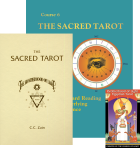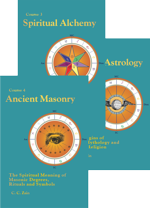|
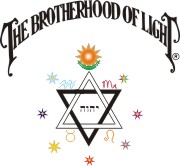
Serial Lesson 72
From Course VII, Spiritual Astrology, Chapter 2
Original Copyright 1935,
Elbert Benjamine (a.k.a. C. C. Zain)
Copyright 2011, The Church of Light
Subheadings:
Passover: Ancient and Modern
The Drama of the Triangle
The Fountain of Eternal Youth
Knight Errant of the Zodiac
Illustrations:
Aries - I AM
Aries/Aries: Triangulum - Activity
Aries/Leo: Eridanus - Exaltation
Aries/Sagittarius: Perseus - Propaganda
Chapter 2
The Fountain of Youth
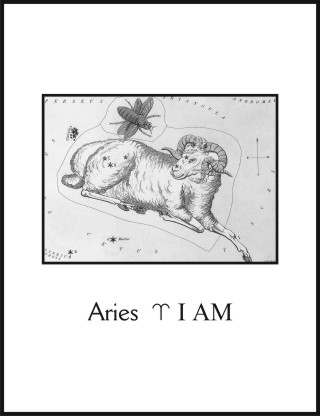
Passover: Ancient and Modern

Only in spring occurs that
significant astronomical phenomenon which anciently was celebrated by the feast
of the Passover.
This festival, in its essential elements, although called by
different names in other lands, was not unique to the Jews. Nor was its
observance confined to the Old World; for we find the American Indians also
celebrating in quite as appropriate a fashion the passing of the Sun from
darkness into light.
The Hopis, for instance, eagerly watch for the time in
spring when the Sun shall rise exactly behind a certain peak of the San
Francisco range. For generations they have recognized that when the Sun thus
climbs the mountain, to balance a fiery globe atop its lofty spire,
that days and nights are equal; and thence forward the day in length
will exceed the night.
Because at this time the nights are thus equal to the days,
we moderns call it the equinox.
It is, in truth, the passing over to the summer half of the
year, from the dreary months of winter darkness.
When we think of the privation endured by primitive people,
and even by our American pioneers, as their stored supplies became exhausted at
the end of the season of snow and cold, we can have no surprise that they
universally celebrated the passing of the Sun over the celestial equator from
south to north, heralding, as it does, the commencement of the growing period
with its new supply of food and its relief from the icy blasts that make
demands for special clothes and shelter.
The less provident people of our state of Michigan are wont
to say as winter draws to an end that if they can only hold out until the leeks
come that their troubles will be over. The leek is an edible plant closely
related to the onion. It grows abundantly in the Michigan woods, affords
considerable nourishment, and is one of the very first of the "bitter herbs" to
show green above the ground.
Why astronomers, both ancient and modern, considered the
Vernal Equinox, or 0 degrees Aries, as the best starting point for both time
and for measuring the east-west position of a star or planet in the sky, has
fully been explained in Chapter 1 (Serial Lesson 71), as also was there set
forth the method followed in selecting the pictograph symbols that they traced
in the heavens, and about which they told stories and established customs by
way of further explanation.
In this language of universal symbols
which they employed the winter half of the circle, in which the darkness
exceeds the light, is representative of our physical world and its obscuring
clouds of misconceptions. The spiritual world, and the spiritual life,
are referred to the summer half of the celestial circle.
Even as a week had seven days, one ruled over by each
planet, so the life of man had seven corresponding phases of activity. The Sun,
of course, was then as now, recognized as the source of virile power.
Among the Jews, who had acquired some of the ancient Stellar
Wisdom, it was desired that each boy should be consecrated to a spiritual life
of constructive effort. That each planet should have opportunity to impress its
influence upon the child before this consecration, and that thus all seven
phases of activity should be impressed by the ceremony, seven full days were
allowed to elapse after birth.
When the Sun had circled the zodiac and passed over the
Vernal Equinox into Aries, a new year began. This to many ancient peoples as well as the Jews,
symbolized the transition from the physical world to the spiritual plane of
life. To signify that the child, while still on earth, was consecrated to a
life of spiritual endeavor, a ceremony was instituted which should represent
the circling of the Sun and its annual transition. On the eighth day the boy
was circumcised.
As the section of the zodiac pictured by the Ram, into which
the Sun moves as it completes its transition, embraces 30 degrees, at its very
commencement it could hardly be considered a full-grown sheep. Not only among
the Jews, but among other ancient people, the first entrance of the Sun into
the sign was associated with the beginning of a ram, that is, it was considered
to signify a Lamb.
Using the blood of a Lamb as a token that a new and
spiritual life had been entered upon was not a custom confined to Christian and
Jew; it was part of that universal symbolism employed by all peoples who had
inherited traditions based upon stellar correspondences.
The land of Egypt was referred to by the Jews as the land of
darkness, corresponding to the dark signs of the zodiac, in which the Sun is
prisoner before it passes over into the summer signs. The last of these signs,
Pisces, has astrological rule over slavery and imprisonment, and the Israelites
were captive in Egypt. The three constellations picturing its decanates are Cepheus, the king
of Ethiopia, who sits on a throne; Cassiopeia, the queen of Ethiopia; and
Andromeda, their daughter, who is chained to a rock.
The day anciently, as at present, commenced at midnight.
When the Sun reaches the Vernal Equinox and first touches the Lamb, it requires
about six hours after midnight before it rises. Those sections of the zodiac
through which it already has passed are of the old order, the old cycle, and
are thus among the first born. Also on that day before the Sun appears, and after
midnight, there are first born, rising through the house of birth to appear
above the horizon ahead of the Sun, Capricorn, the goat; Equuleus,
the horse; Pegasus, the winged horse; the king; the queen; and their captive
daughter. Yet these all belong to that part of the celestial circle cut off by
the passover into Aries.
Aries is a militant sign, and thus the Bible relates, "And
it came to pass that at midnight the Lord smote all the firstborn in the land
of Egypt, from the firstborn of Pharaoh that sat on the throne, unto the
firstborn of the captive that was in the dungeon; and all the firstborn of
cattle."
Exodus gives the rules to be observed during the passover ceremonies. No leaven
bread was permitted in the house for a period of seven days, leaven being the
symbol of impurity and pollution. At the feast the Lamb could not be eaten raw,
nor sodden with water, but must be roasted; for Aries
is a fiery sign. And it must be eaten with bitter herbs, to indicate the new
growth and that the transition from physical life is not without discomfort. To
show that the transition should be complete, avoiding earthbound conditions, any that remained in the morning must be
cremated.
The Lamb to be used at the passover ceremony must be without blemish, in the
first year of its life, and when slain, its blood was to be daubed on the
lintel and two side posts of the door to the house. Thousands of doorways,
formed of huge stones, where no houses have been, remain in various parts of
the world where erected by prehistoric people. On top of two or more upright
pillars, there is placed a huge slab of rock to indicate a plane above the
earth, that is, a plane of life where people consciously dwell and perform
their activities after they have passed through that doorway which commonly we
call death.
The feast was to be attended, "with your loins girded, your
shoes on your feet, and your staff in your hand; and ye shall eat it in haste."
The Jews who attended as thus instructed were plainly
prepared to go places and do things. The daubing of the lintels with the blood
of a Lamb portrays, in universal symbolism, the belief of those who originated
the ceremony that we enter physical life through a doorway of pain and
suffering, and that we take our departure to the next life through another
doorway no less difficult. Yet because the blood used is that of the animal by
which birth and happier days are represented, it also expresses the conviction
that the new life will be an improvement over the one from which the passover has been made.
In a still broader sense the passover of the year has its counterpart in the precessional cycle. But instead of the Sun passing over the
Vernal Equinox, the boundary between sections of the stellar circle does the
passing. Thus have we now passed over into the Aquarian Age.
Pisces, the sign from which the world is passing, rules not
merely imprisonment and restrictions, but crime and its punishment. It gave us
a heaven which to most would be nothing more than a prison, and it taught us
the doctrine of everlasting torment in hell.
With one hand Aquarius measures the influence of the stars,
and with the other pours down his blessings. Right now the world is enduring
the pangs of its birth into a heaven of new knowledge. The blood
on the doorposts are but the incidents of this passing.
Many truths this new Aquarian Age will unfold. But none
perhaps, of greater import to the human race that a detailed knowledge of
conditions in the after life, of the best training
here to fit the individual for his eventual responsibilities there, and the
establishment of a non-restricted system of communication between those who
live and function on the different planes.
Aries has been given the Key phrase, I Am, on account of
those born under this influence, more than other people, viewing things from
the standpoint of Individual survival and expression. Because of this, because
they are pioneers who venture into new lands, and because it is here that the
transition symbolically takes place, it is eminently fitting that the ancients
associated the Ram with their teachings of survival. The text they sought to
convey by Aries has been expressed by the poet:
"There is no death! What seems so is transition:
This life of mortal breath
Is but a suburb of the life Elysian
Whose portal we call death."
The Drama of the Triangle
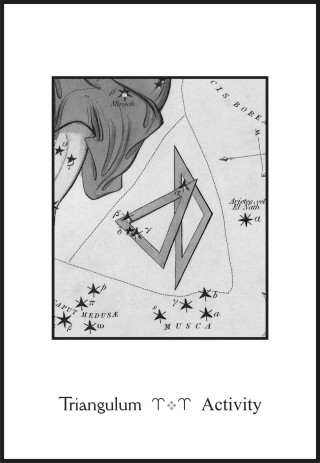

If one has ever watched an old ram lead his flock, the use
of the Ram to head the procession of constellations will call for no further
explanation. The section covered by Aries, however, embraces a full 30 degrees,
and is divided into three subsections, called decanates,
of 10 degrees, each having a distinct influence, which calls for a distinct
spiritual teaching, or text, of its own. And until a little thought is given to
the matter it is not so obvious why the very first 10 degrees of the zodiac
should be represented, not by some heroic figure like Perseus or Hercules, but
by something as prosaic and unromantic as the diagram of a triangle.
Yet as each of the other constellations of the 48 was
carefully chosen and given its particular place where best it would convey
specific information, we must conclude that the placing of a triangle at the
beginning of the circle of decanates was not due to
lack of more glamorous figures, but was prompted by the necessity of conveying
some profound meaning.
Universal symbolism, a language which does
not change with age nor race nor clime, is based upon common human
experience. And as human nature in its essentials changes but little with the
ages, our first response to the word triangle is probably that of bygone times.
The domestic triangle is a favorite plot of stage and story, and a never-ending
source of news headlines and neighborhood gossip. But in its more universal
application just what does such a triangle imply?
Essentially, even as the green coloring matter in leaves in
the presence of sunlight exerts so strong an attraction for the atoms of carbon
in the air that they desert the oxygen atoms, with which they have been united
as carbon dioxide, to enter a new partnership with atoms of the leafy
structure; so does a domestic triangle embrace two forces acting upon a single
center, yet pulling in a different direction.
The three sides of the constellated triangle express, better
than anything of which I can think, two energies of different polarity, that
is, with a different type of motion, united, and the result of that union.
While such a domestic triangle as has been mentioned,
suggested by its drama quite as much as by the frequency of its occurrence, is
indicated by the starry trine, there is another domestic triangle of still more
common occurrence. Father, mother, child, are portrayed in the heavens, have
positions of honor on both the tarot and the common playing cards, and
represent the means by which nature reproduces and perpetuates the species.
Thus the domestic triangle, suggested by the trine of
heaven, upon reflection reveals to us that the interaction of two forces, the
diverse pull of polarity, has a potency in either of
two directions: It may either build up or tear down, be devoted to creation and
construction, or turned into channels which disrupt and destroy.
Although our physical lives are entirely dependent upon such
constructive use of carbon taken from the air by leaves, all food coming to us
either directly from the vegetable world or indirectly through other animals
that have so obtained it, I believe we should seek in antiquity for the reason
that the triangle, thus revealed as all important, should have been placed at
the very beginning of the zodiac.
Let us, then, take the story which has come down to us from
the remote past which serves as commentary to the first pictograph in the
decanate circle. We might well suppose that the start of the starry circle
would find explanation at the commencement of some sacred work. Let me,
therefore, quote the first three verses of the Bible:
"In the beginning God created the heaven and the earth. And
the earth was without form and void; and darkness was upon the face of the
deep. And the Spirit of God moved upon the face of the waters. And God said,
Let there is light: and there was light."
Great scientific learning is possessed at the present day.
But with it all no better nor more scientific
description of the bringing into existence of the material universe has ever
offered. Out in the infinite spaces, Millikan believes matter is being created,
and Jeans believes matter is being destroyed; as revealed by the terrific
energy released in the formation of the cosmic ray.
Many scientists hold that stresses in the ether shear out
right-hand and left-hand spirals of motion which are positive and negative
charges of electricity such as, according to Millikan and Jeans, form the
protons and electrons of matter which out in space is being created or
destroyed. It is the same kind of matter of which our world is composed.
Substituting the ether of science for heaven and the matter
sheared out of it for the earth, and we possess two sides of the constellated
triangle, and a Bible description of the beginning of physical existence which
at every point is parallel to that offered by material science.
Until there was the stress of two forces, strains pulling
the ether in diverse direction, our men of science say that existence was
without form and void; and as light is a particular motion in the ether, there
was darkness everywhere.
Cosmic rays, resulting from the creation or destruction of
matter, are invisible, as are many other waves in the ether, and thus even when
ether and matter, as heaven and earth, were given existence, darkness may still
have accompanied these waves; moving upon the face of the deep.
Nevertheless, this interaction, or polarity, generates
movement; in fact, no movement, physical, mental or spiritual, ever takes place
apart from the union of positive and negative potencies. Thus whether visible
or not, when heaven and earth, positive and negative, ether and matter are
present, there is action, which, as it is chiefly wavelike and not understood
as to its exact nature, is well described as the Spirit of God moving upon the
face of the waters and the third side of the universal triangle.
When, however, this energy reaches an intensity that causes
the electrons revolving in given orbits about the nucleus of an atom, to make
big jumps from their accustomed orbits to other paths, there is a spilling out
of energy into the surrounding ether which sets up those wave frequencies that
we see, and call light. Light, therefore, while not the only product of the
first interaction of positive and negative forces that divided ether from
matter, heaven from earth, was a product that is of paramount importance to
human life. As previously indicated, all the food we eat is manufactured by the
green leaves of plants, and only in the presence of light.
To trace the universal application of this creative
principle would be to encompass the entire realm of science, philosophy and the
innumerable relations of life; for the first factor leading to every result is
the union of the other two sides of the triangle.
As we are interested in the signs, decanates
and constellations, let us consider how they are located and measured; by
triangles, of course. Distances along the zodiacal circle from the Vernal
Equinox, and distances north and south of the celestial equator, in fact, all
distances considered in astrology, are measured and expressed in degrees of
arc.
Such an arc is really one side of a triangle, the other two
sides being the lines extending from its ends and meeting at the point of
observation. The number of degrees east or west, north or south, either in the
sky or on the surface of the earth, is merely an expression of the angle
between the two lines which extend to the extremities of the third side of the
triangle, which is an arc.
The science of spherical geometry and the science of
trigonometry were both developed in olden times, and made skilled use of by
Hipparchus before the Christian era, to plot the stars and constellations and
measure the relations of the planets, each to the other.
The first measurements of time, and also of the positions of
the Sun, were made by shadows cast by a stake upon the ground. By such shadows
recorded at noon on the longest day and the shortest day of the year, the
Chinese, in 1100 BC ascertained the inclination of the earth to the ecliptic.
The stake and the shadow on the ground formed the sides of a right-angled
triangle, the hypotenuse being the line from the top of the stake to the end of
the shadow. Measuring this angle at the two specified dates, and dividing by
two, gave them the angular distance north and south of the equator of the
tropic of Cancer and the tropic of Capricorn.
The astrolabe was invented to measure the angular elevation
of stars and other bodies which do not cast a shadow which can be measured. And
as an astrolabe was a clumsy thing to use aboard a rolling ship, in rather
modern times the sextant was developed from it as chief aid to navigation.
Thus it is that triangulation enters now into all surveying
on the earth, and all plotting of the heavens; and any mariner who would
venture far from land without an instrument by which through the use of
triangulation based on his observation of Sun or Moon or stars he can locate
his latitude, would be deemed mad.
The measurement of angles—triangulation—is not merely the first
step in astronomical knowledge and astrological practice, but the importance of
the trinity at the beginning of everything has been recognized by all the great
religions of the world: Father, Son and Holy Ghost of Christendom; Brahma
Vishnu and Siva of the Hindus; Osiris, Isis and Horus of ancient Egypt.
Creation involves a trinity, as also does destruction. It is
only when the union of contending or divergent factions is properly directed
that we attain true progress. Either in our mental conceptions or in our
political systems, there must be some destruction of the old, worn tissues, to
give place for the sound and new. Yet if the old is destroyed too swiftly and
completely, there is insufficient power for recovery.
Those who are born from March 21 to March 31, while the Sun
is in the decanate pictured by Triangulum, are distinguished for their
Activity. And the starry triangle itself sets forth in its own symbolical
language the text: All Life, Thought and Action Are the Product of the Union of
Positive and Negative Potencies.
The Fountain of Eternal Youth
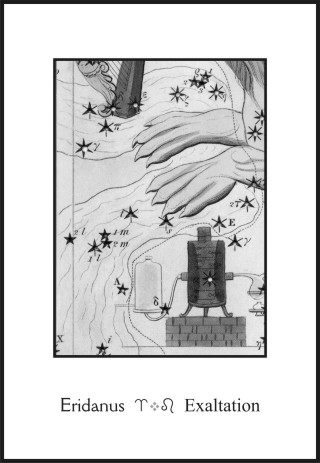

As the first 30 degrees of the zodiac are pictured by a Ram
to denote that they relate to creative energies, we may be sure, as already we
have found in relation to the domestic trine, that the
other two decanates also have to do with the creative
trinity.
We find the Leo decanate to be pictured by a river; the
significance of which, I believe, is clearly set forth in the second verse of
the Bible; for as the land can bring forth only when united to water, so in the
story of creation, as soon as heaven and earth were manifest, the Spirit of God
moved upon the face of the waters. That is, water is used immediately, even
while the earth was without form and void, to symbolize the medium, or agent,
through which the Spirit of God accomplished His purpose.
Now what is this thing in human life having a wavelike
motion which is essential, as water is to parched earth, to its production? The
zodiac quickly gives us the clue; for the starry river pictures a decanate
having a sub-influence of Leo, which in a natural birth chart rules pleasures,
love affairs, entertainment and children. Probably, therefore, the river is
affected by all of these things.
The most characteristic factor common to enjoyment, love,
and the production and care of children is emotion. The Keyword for the watery
signs of the zodiac is emotion, and water, from time immemorial, has been used
as the universal symbol of those mental states which cause a ripple of the
nervous system, as the surface of a pond is stirred by a summer breeze.
Our river Eridanus,
however, in which the bestial Cetus dabbles his paws,
and on the bank of which brave Orion struggles with the mighty Bull, is a
particular kind of water. It is not just any pond, nor is it a raging
torrent. It is emotion, but not of the Passive, sluggish kind; nor yet is it
torrid passion. This river is deep, strong of current, and ample wide. For more details concerning it, let us turn to the rivers of
tradition.
Across the black waters of the river Styx, the Greeks were
wont to have Charon ferry the souls of their dead;
while in Egypt, the boat of the Sun transported them to the judgment seat of
Osiris. Thus is the river quite definitely associated in one of its functions
with the passing over so aptly symbolized by the beginning of Aries.
Just what part this river—picturing the decanate where the
Sun, in whose boat the soul is said to depart, has its highest influence plays
in that after life, and how it determines the plane of man’s earthly endeavors,
sacred literature reveals quite fully in either of two stories; one from the
Bible and the other from the Greeks. But as already, with no aid from these, it
has become apparent that our river relates to the emotions,
let us first consider their chief influence upon human life.
Ponce de Leon might have saved himself much travel in search
of this same fountain of eternal youth, so aptly pictured by the river in the
sky, had he but known about his endocrine glands, and the varied response of
their secretions to the emotions. Minute chemical messengers, secreted into the
blood, burn up the life in fits of rage, starve the organs in fear and
melancholy, and add youth and vigor at the behest, not of passion, but of
unselfish lore.
Endocrinology has made it plain just how gross desires and
ignoble delights add poison to the system; just how, also, the tender feeling
of a mother for her babe, or the compassion which prompts the aid of those in
distress, tones up the structure of the physical cells, conferring beauty,
strength, and years of life. Here, however, even more than with the welfare of
the body, are we intent upon discovering those laws which rule the fortune and
the station of the individual, now and hereafter.
That finer body of man, his astral form, the energies of
which, as may be proved by progressed aspects and his birth chart, determine
not only his abilities but also each event that comes into his life, is thought
built. His character is composed of thought cells derived from his experiences,
and these thought cells have been compounded of such grades of four-dimensional
substance as correspond to the feelings and desires coincident with their
formation. They have been compounded also in association with pleasure or pain,
and to the extent they feel discord do they attract misfortune into the life,
and to the extent they feel pleasure do they work to bring good fortune.
Nor is this Law of Affinity confined in its operation to the
physical plane. The thought-built body is the one that persists beyond the
tomb. The basic vibratory rate of the character, in that after life, determines
the plane, or level, to which it moves. In fact, here or hereafter, it can
neither rise above nor go below its basic vibratory level except as some finer
emotional state temporarily raises its vibrations, or as through baser
inclinations it lowers them to inferior strata.
In that after life, even more than here, the environment to
which an individual is attracted is determined by his strong desires. Emotion
not only expresses, but nourishes and fattens, kindred inclinations.
Man’s etheric body, and the
currents which flow over his nerves, as well as his astral form, are receptive
to vibratory rates of similar tone coming from without. Thoughts
of sufficient potency to engender feeling tune the etheric
forces in on planetary energies of similar kind. Thus, not only is man a
radio-receiving set, but his emotions turn the dial to the program which he
receives.
Furthermore, again considering the domestic triangle with
which we started on our tour of the decanates, when
man and woman are joined in the pure affection of family life, there is a blend
of mental and etheric forces, a stream of energy,
flowing from each to the other. A complete circuit is formed between them, an
invisible river, which transfers without need of speech, the thoughts and
inward aspirations.
Those thus united by the astral and etheric
flow pictured as Eridanus are said to be in rapport.
And their ability to pick up invisible energies of corresponding quality in
volume is immeasurably increased. It becomes a potent means, therefore, of
lifting them to greater heights, or misused, is equally powerful in their own
destruction.
The Greeks relate that Phryxus and
Helle were the children of Nephele, queen of Thebes.
As the only queen in the sky is Cassiopeia, picturing the last decanate of the
emotional sign Pisces, these children must be represented, not by Andromeda
chained to a rock, but by two fish. This is further borne out by the ribbon of
love uniting them, as the etheric river Eridanus binds together through affectional power.
These children were persecuted by their stepmother Ino, pictured directly across the zodiac as Virgo, the
critical woman. To escape her faultfinding and more serious intentions, the
queen provided the youngsters with a Ram which was to transport them through
the sky to Colchis.
The Ram rose high in the air, bearing on its back, even as
can be seen now on any winter evening, the two children—for Pisces rises just
above Aries. Phryxus kept his seat and reached his
destination in safety. But so high did Aries soar, and so swiftly did he move,
that Helle became giddy and fell off, to meet a tragic death in that stream now
called the Dardanelles, but renowned in song and story, thus named because of
the event just related, as the Hellespont.
The Ram, universal symbol of creative energy, carries those
in safety who are level headed enough not to meddle with rousing the kundalini, or with any one of the abnormal methods by which
energies are engendered that once set in motion, more frequently than not, get
beyond control. Nor does it offer any menace to those who truly live in
chastity. But to those who stimulate and then repress, in monastic life or out
of it, desires which normally find expression in founding a family, as there is
now a vast psychoanalytic literature to prove, the fate of Helle offers
warning.
Of similar purport, and also indicating the survival values
in the afterlife, of properly cultivated emotions, is a story of passing over
the Jordan as retained in the twelfth chapter of the Book of Judges.
There had been a fight, and the Gileadites had taken possession of the river crossings. Survivors of their vanquished
foes, the Ephraimites, sought to escape through
fording the river; and to do so claimed to be men of
their own troops. Whereupon, to determine if this were so, they were required
to pronounce the word Shibboleth. This they could not do if they were Ephraimites, as they were unable to sound the H, speaking
it Sibboleth.
This H, inability to pronounce which doomed the Ephraimites to be slain, is the second syllable in the
divine word, and its omission denoted to those familiar with its significance,
that the feminine principle, which constitutes one important factor in the
trinity when its action is constructive, was missing. In the language of
symbolism it was the lack of the softer, finer, kinder, and sympathetic
emotional qualities which betrayed the Ephraimites,
and prevented their crossing the river in safety.
In practical astrology it is found that the Sun exerts its
finest power from April 1 to April 11, while in the Leo decanate of Aries, long
recognized as the region of its exaltation. And it was to portray that quality
in human life which more than any other is able to lift the soul to lofty
heights, give youth to the body, and assure immortality in the realms of the
beyond, that the ancients sought a fitting symbol.
The Keyword of the decanate is Exaltation; and it would be
difficult to find a symbol which so clearly indicates the means to attain this
end as does the celestial river. Eridanus, to those
who read its purport, sets forth this text: The Fountain of Immortal Life
Springs From Man’s Emotional Nature; the Vibrations of
Exalted Love Having a Rate Sufficiently Frequent to Affect Spiritual Substance and
Build a Spiritual Body.
Knight Errant of the Zodiac
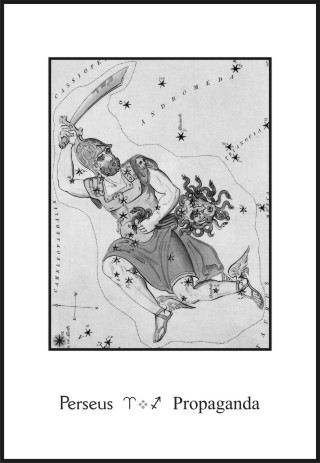

Only since the World War, when bureaus were established to
create a public opinion favorable to certain ends regardless of their merit,
has the term Propaganda, which is the Keyword for the last decanate of Aries,
fallen into some disrepute. Its original meaning was that of an organization by
which some doctrine or system of principles could be disseminated.
People born from April 11 to April 21 are observed to have a
spontaneous enthusiasm for ideas and plans which interest them, and a special
ability to impart similar enthusiasm to others. It is not enough for them to
believe some doctrine to be worthwhile; they must also broadcast it to the ends
of the earth. And they are as quick to attack falsehood and corruption as they
are to strive for worldwide recognition of such truths as they have found.
The ninth house of a birth chart, over which Sagittarius has
natural rule, governs long journeys and air travel; also teaching, lecturing,
preaching, publishing, radio broadcasting, and all other means by which
opinions are expressed to others. The Sagittarius decanate of Aries, therefore,
relates somewhat to such things. Thought, which is thus expressed, is so swift
that speeding on the wings of thought has become a current literary phrase,
conveying the same idea that the ancients did when they placed wings on the
feet of Mercury and Perseus.
In addition to wings on his feet, which Greek legend says
were furnished by Mercury, the ruler of thought, Perseus is equipped with a
sword, the tip of which is as close to the line which cuts off the old circle
and starts the new as it can be and yet follow Triangulum and Eridanus where their outlines are farthest west in
longitude. You will remember that David of the Bible had no sword, but that he
used one in victory to sever the head—which is ruled by Aries—from the body of
the fallen Goliath.
The severed head which constellated Perseus holds is not
that of the biblical personification of greed and selfishness, but that of the
Gorgon Medusa. In the Bible story it was Goliath who wore the helmet, now seen
on the champion of truth and righteousness. Also a famous shield went before
Goliath; but in the Greek story is used by heroic Perseus, and is not pictured
in the heavens.
To understand these stories of David and Perseus it must be
recognized that the ancients knew what modern astrologers grant, that people
born with the last Decanate of Aries dominant are natural champions in the
cause of truth and ever fighting to destroy greed, licentiousness, and those
materialistic trends which fasten shackles on the soul.
In both stories a stone appears, one the smooth white pebble
of scientific truth, of material knowledge completely understood, which
vanquishes selfishness through the realization that its
crystallizing power so narrows the field of accomplishment that its own ends
are defeated. The gross, the bestial, the greediness which seeks its own
pleasure and welfare only, as typified by Goliath, when seen in the light of
careful reflection, are not the way even to the highest material pleasures.
Enjoyment of life, even physical enjoyment, is dependent upon appreciation of
quality. It is dependent upon a responsiveness to the
aspirations of others, and a progress toward refinement, both of which are
denied by impervious selfishness.
This aspect of the matter, and that of the influence of
licentious thought to coarsen and harden, is made quite plain in the legend of
the Medusa, whose hair was serpents, so awful in appearance that whosoever
looked upon her was immediately turned to stone.
Perseus, picturing the Jupiter decanate of Aries, was the
favorite of Minerva, a goddess who, as personifying the mental rather than the
sporting side of Jupiter’s dual sign, sprang without a mother, full armored,
from the brow of this Sagittarian ruler.
Minerva is mentioned only because, when Perseus decided to
rid the world of the wicked Medusa, she furnished him with a shield so highly
polished that he could approach the lascivious monster without actually looking
at her. Had he glanced directly at her dread countenance, he, as had so many
others, should have been turned to stone. But the shield of Minerva, the mirror
of the higher mind, gave him the reflection of this seducer of men, so that,
while she slept he was able to make a stealthy approach and sever the
terrifying head from her body.
No greater wisdom was ever uttered in reference to character
building than is thus dramatically presented. Impure thoughts and unworthy
desires not only harden the individual, but they thrive and prosper to the
extent attention is paid to them.
There is but one way to destroy them, the way employed by
Perseus; and that is to become so interested in something else that the
attention is riveted to it—as his gaze was fixed on the mirror of his shield—so
persistently that there is no room for the image of the undesirable to find its
way into the field of vision.
When we think about a thing we create it in the astral
world. Way back in Bible times it was said, that which we fear shall come upon
us, and modern psychology is in full agreement with this view. To fear a thing
is to keep its image before the mind and, by the accompanying emotion, to
nourish it.
But whether the image is vicious or beneficial, destructive
or constructive, the energy added to it by whatever emotion is present—fear,
anger, hatred, joy, happiness, affection—sets the thought cells within the
astral body related to this department of life to working from the
four-dimensional plane to attract that thing into the life. If, therefore, the
thing be detrimental, find other occupation for the vision of the mind.
This same principle also must be followed if there is to be
success in building better habit systems, if there is to be success in avoiding
the inimical thoughts of others, and in combating undesirable psychic forces.
The more a habit is thought about, and the greater the emotion felt when so
thinking, the more strongly does it become impressed upon the unconscious mind. Bad habits can be cured only through the substitution
of beneficial ones which crowd them from the life.
Not all of this Medusa story has
been told; only that which relates to mental images and the desires of physical
life. She was one of three Gorgon sisters, and when she was slain there was
danger of reprisal. Perseus was able to escape them, however, by the use of the
helmet shown in the constellation, which made him invisible.
This helmet had been provided by Pluto, ruler of the
underworld; the planet now assigned to govern the eighth house of a natural
birth chart, the house which rules all influences from, and relations to, the
dead. More than any other planet its influence is such as to enable the
individual to tune his vibrations, radio fashion, to influences from the
invisible world.
Those who have difficulties of a psychic nature, who have
tampered unwisely with the invisible world, are here instructed by the wisdom
of the past, as handed down through universal symbolism, in the best method of
escaping from these remaining Gorgon sisters.
When through strong desire, we tune ourselves quite
completely to one frequency of vibratory rates, this automatically cuts off
others. When the dial of a radio set is tuned to pick up the program broadcast
by one station, this eliminates the reception of programs which are broadcast
over frequencies quite dissimilar. Thus it is, as proved by the experience of
many people, that the best way to escape an undesirable psychic influence is
not to fight it, which tunes the finer body to receive its rates, but to wear
the helmet of Pluto, and become invisible and unaffected by its power, through
completely and persistently tuning in on some dissimilar and constructive
interest.
True to the Keyword of the pictured decanate, Perseus was a
glamorous hero who felt it necessary to help the world along. Escaping from the
remaining Gorgon sisters, and triumphantly bearing the severed Medusa’s head,
he flew high through the air; an aviation exploit
which led him to the discovery of a princess in distress.
Like many mothers now Cassiopeia was a slave to pride and
station. She wished to be the envy of all the other women in the world. And in
her desire to outdo them she boasts of her beauty, claiming to be of greater
charm than Juno and the Nereides, nymphs of the sea.
This so angers Neptune—who rules the sign in which the decanates
pictured by Cassiopeia and Andromeda are found—that he has her daughter,
Andromeda, chained to a rock in the sea for the monster Cetus
to devour.
But before this fearsome human sacrifice is completed,
Perseus, flying high overhead after his conquest of the Medusa, spies the fair
maiden in distress, dashes to the rescue, vanquishes the monster of the sea,
releases her, and carries her off in happy marriage.
We will not here dwell upon the release of the human soul
from the blind beliefs of the Piscean Age through the dissemination of correct
information. Nor is it necessary to comment upon the power of undue attachment
to any material thing to bind the soul to earth, and prevent its progress, both
here and immediately after death.
But again it should be pointed out that the character of the
individual is the sum total of his experiences stored in the thought cells of
his finer body. No one can change these for him; no one, therefore, except
himself, can slay the beast within nor overcome the noxious influence of
creeping slimy thought, nor release the soul from other bondage.
The exploits of Perseus each, in symbolical language,
conveys an important message; but most important of all, he accomplished the
work himself. The leading text thus portrayed, therefore is: There is No
Vicarious Atonement. Each Soul is a Responsible Being, Working Out its Own
Deliverance from the Thralldom Inherited from Ancestry and Forced Upon It by Environment.

|











